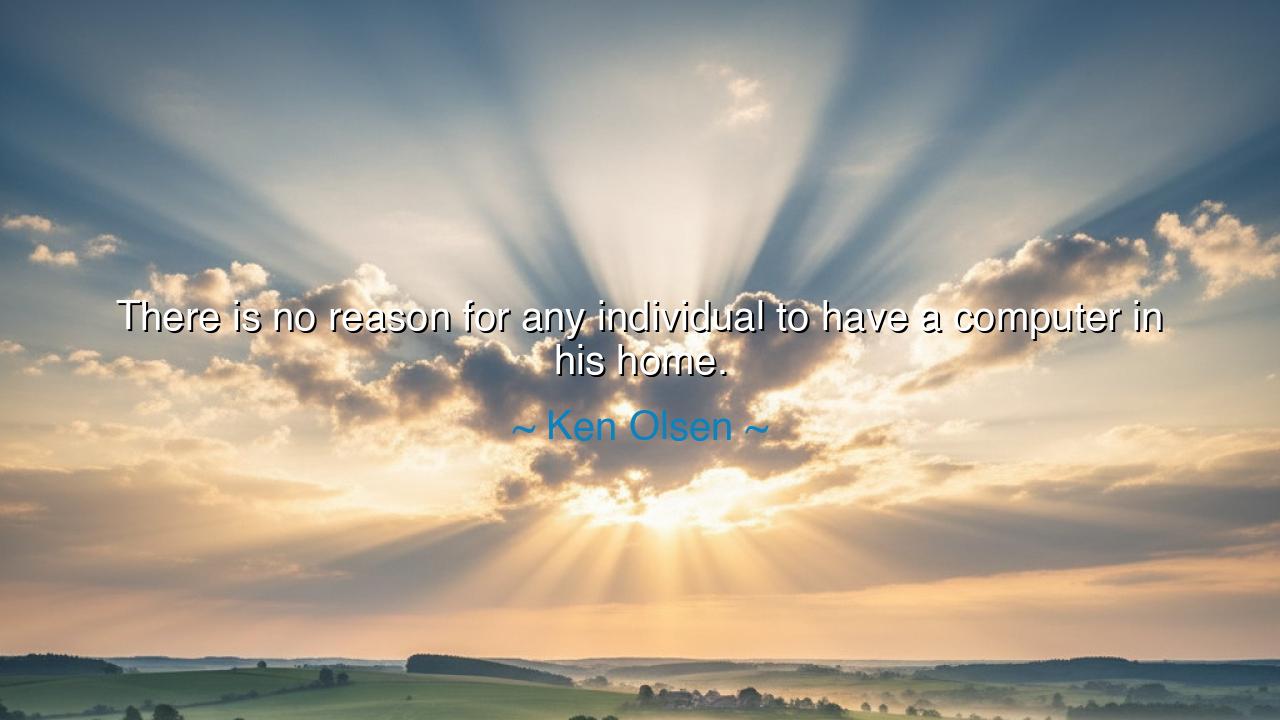
There is no reason for any individual to have a computer in his






In the great sweep of human history, few technologies have transformed the world as profoundly as the computer. Yet, at a time when the world was on the cusp of the digital revolution, Ken Olsen famously declared, "There is no reason for any individual to have a computer in his home." At first glance, these words might seem almost archaic, an opinion out of step with the technological age we now inhabit. But in them, there is a lesson that resonates deeply with the human spirit—a call to question the path we are on and to recognize the deeper implications of our creations. Olsen’s statement forces us to reflect on the true purpose of technology and whether it serves humanity or enslaves it.
In the ancient world, the philosophers constantly pondered the role of human beings in the greater cosmos. They sought wisdom, not through accumulation, but through reflection on the nature of existence. Socrates famously believed that knowledge could not be attained through mere accumulation of facts but through self-awareness and thoughtful inquiry. Much like Socrates, Olsen’s words challenge us to consider not just the advantages of technology, but whether it serves the human spirit or distances us from our true nature. The question is not whether a computer can benefit us, but whether it detracts from what truly makes us human—our ability to think, reflect, and engage with the world in meaningful ways.
In the 20th century, as the world saw the rise of the information age, computers began to make their way into homes, transforming the way people worked, communicated, and interacted with the world. However, as we embraced these innovations, we also began to notice their hidden consequences. People became addicted to the constant stream of information, distracted by the never-ending flow of emails, news, and social media. The philosopher Albert Einstein, in his reflections on the modern world, warned of the danger of technology replacing the human touch. His words are a reminder that, in our pursuit of progress, we must remain vigilant not to lose the essence of what makes us truly human. Olsen’s skepticism toward the home computer could be seen as a cautionary tale, urging us to reflect on how technology changes not only the way we live but the way we think and feel.
Consider the story of Leonardo da Vinci, whose genius spanned the realms of art, science, and engineering. Da Vinci was a master of tools and inventions, yet he never became overly reliant on any one device to shape his ideas. His notebooks, filled with sketches and inventions, were created through direct interaction with the world around him, not through artificial constructs that disconnected him from nature and reality. Da Vinci’s work reminds us that true creativity is grounded in the ability to observe, to reflect, and to engage with the physical world. He didn’t need a machine to stir his imagination—his thoughts were grounded in the tactile, in the real world. In this sense, Olsen’s quote resonates as a call to reclaim the human touch, to find a deeper connection with the world beyond the glow of the screen.
Olsen’s warning is not an argument against innovation itself but a call for balance. Just as the ancient Romans knew that the virtue of a society rested not in its ability to conquer the world but in its ability to govern itself wisely, so too must we recognize that technology must serve us, not the other way around. The rise of the internet, the smartphone, and the computer has given us access to knowledge like never before, but it has also made us vulnerable to distraction and dependence. In our pursuit of progress, we must remember that the true measure of a society is not its mastery of machines, but its ability to use those machines to foster connection, creativity, and meaning.
The lesson here is one of awareness and intention. Olsen urges us to question the assumptions that guide us into the future. Just as the ancients warned against becoming enslaved to luxury, so too must we be wary of becoming overly reliant on technology. In every new tool, there is both the promise of improvement and the potential for disconnection. While computers can provide great benefit, we must always ask: does this tool enhance our lives, or does it pull us away from what truly matters? It is not enough to accept technology blindly; we must use it with purpose, ensuring that it serves the human values of connection, creativity, and reflection.
In practical terms, this means taking the time to disconnect and reflect on the role technology plays in our lives. Can we live more simply, more meaningfully, without being consumed by the devices we create? Do we use our computers to foster learning and creativity, or do we let them become distractions that pull us away from the human connection we need? Just as Olsen challenged the necessity of having a computer in the home, we too must challenge the necessity of allowing technology to control our time, our relationships, and our well-being. Let us use it as a tool, but never let it become the master.
Finally, Olsen’s words serve as a reminder of the importance of reflection and moderation. Technology, like any tool, has the power to both create and destroy, to connect and to alienate. It is our responsibility to ensure that, in our pursuit of progress, we do not lose sight of the things that make us truly human—our ability to think deeply, to engage with the world around us, and to connect with one another in meaningful ways. The future is bright with the potential of technology, but we must walk forward with eyes wide open, ever mindful of its impact on our hearts and minds.






AAdministratorAdministrator
Welcome, honored guests. Please leave a comment, we will respond soon